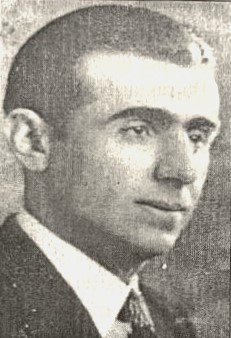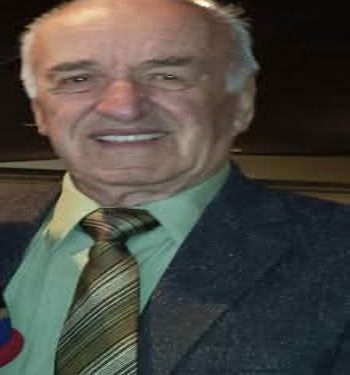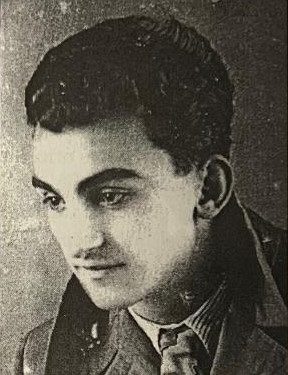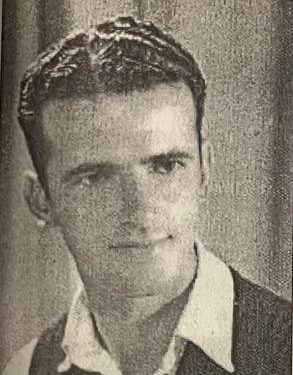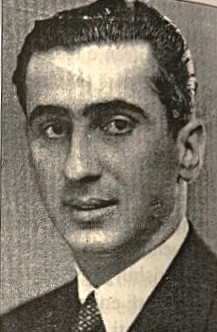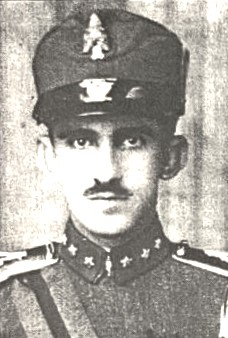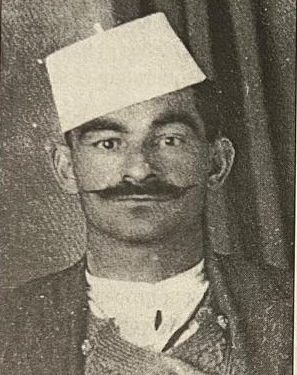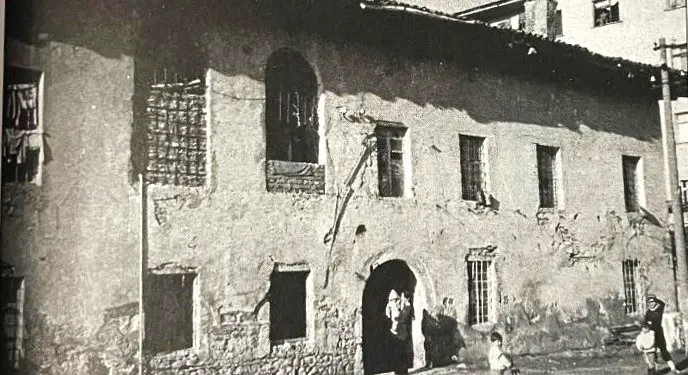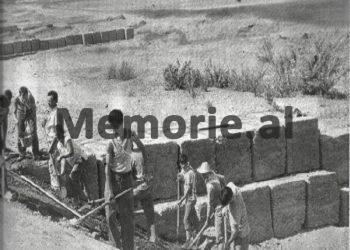By Ahmet Bushati
Part sixteen
Memorie.al/After the flag was altered in 1944 with the addition of the communist star, Shkodra transformed into a center of resistance against the regime, paying a high price for its tradition of freedom. By April 1945, high school students, already feeling betrayed by the promises of the war, gathered to oppose the new terror that imprisoned and killed innocent people. Communism turned Kosovo into a province of Yugoslavia, while Shkodra was punished for its “historical crime”- its defiance against invaders. The “Postriba Movement” became a tool to suppress all dissent, plunging the city into an unprecedented spiral of suffering: imprisonments, executions, and the destruction of families. The high school students, alongside citizens, became symbols of resistance, while some “young communists” turned into tools of the State Security, leading to expulsions, imprisonments, and internments.
Four times, Shkodra rose in armed rebellion, but history forgot these battles. This book is written to remember the countless prisoners, the tortured, the killed, and the parents who suffered in silence. It is a warning against dictatorship and a plea for future generations not to forget the sacrifices made for freedom.
Continued from the previous issue
In the Footsteps of a Diary
Shkodra in the first years under communism
The Kazazi
If there was a family in Shkodra that inherited from all its males the best virtues of their ancestors, such as honor, generosity and courage, and remained at the same time equally polite and modest, it was the Kazazi family. Also, if there was a family that paid for communism with the life or imprisonment of almost all of its males, it was the Kazazis.
Muharrem agë Kazazi, grandson of the aforementioned Hamz Kazazi, and himself one of the most prominent figures of Shkodra, had inherited five sons, all of whom had strong physical features, like the lashers of which there were many, with thick black eyebrows, black eyes and hair, and generally with a complete masculine appearance.
The eldest of them, Halit, had graduated from a military school and served in the army with the rank of captain. As mentioned above, he was caught treasonously while sleeping in the house of a friend of his, who had died years earlier, sentenced to death and shot.
The second son, Jupi, having been a university student in Belgrade, was imprisoned by the Yugoslav government for patriotic activities he had carried out there. For the same reasons, on a second occasion, he was definitively expelled from Yugoslavia, forcing him to continue his studies in political economy and then complete them in Italy.
After the formation of the ‘Balli Kombëtar’ organization, Jup Kazazi would be one of its most prominent activists for the Shkodra area and would hold the position of “regional member” in that organization, as well as that of the main person in charge of setting up the chetas in the North. He distinguished himself in the Reç war, having with him, among others, his brother, Zeneli, as well as an Italian soldier, who he killed on that occasion.
Zeneli, the third of the sons, had graduated from military school in Athens and, later, from the Complementary School in Italy, while Sait, who came after him, had graduated from Jurisprudence in Italy. Hamiti, as the youngest of them, had completed high school, with the hope that he too, like his brothers before him, would continue his studies after the war.
Shortly before Shkodra fell into the hands of the communists, these five brothers decided not to leave Albania, but to stay here, to share their fate with it. Thus, after the so-called “liberation”, the Kazazi brothers would find shelter in the homes of friends and relatives and, with “a finger in the barrel of a rifle”
When Llesh Marashi attacked Koplik, Jupi also thought of doing something similar in Postrriba – according to the story of his man, Ahmet Koplik, in whose house he would shelter them for a long time – but, unable to organize himself, he temporarily gave up on that project. However, in order to raise the morale of the people, he one day took a symbolic action, attacking the “People’s Defense” post at the Mesit Bridge, where he disarmed all its personnel without resistance.
Regarding this event, when Jupi happened to see them at the house of his uncle, Rifat beg Koplik, he would say: “We quickly disarmed everyone who was there, but I was impressed and felt sorry for those soldiers for the fear they had of us. They were afraid that we would kill them, and I, to calm them down, repeated several times in a gentle way. As soldiers and sons of bitches that you are, we have no business with you, you are free from us”.
After a few days, as a result of several arrests that had been made in the city, as well as in the villages and up in Malsi, some of the former bases where Jup Kazazi and his brother had been sheltering were exposed, which forced Jup, Zenel, and Hamit, with their bare feet, to stay hidden for several cold winter days on the top of a high cliff above the Postrriba Mountains, where they would face endless days and nights of rain and snow, having nothing with them but a log for company.
On one of those cold winter nights, Jupi hears a light crack and, immediately waking up his brothers who had been sleeping, and with automatic rifle in hand, he throws himself onto the edge of the cliff, where he notices that a partisan is slowly climbing up his face, when he realizes that that light, indefinable sound that he had barely perceived a moment earlier was none other than the button of the partisan’s hood, which was rubbing as he climbed up the side of the cliff.
No words, but Jupi shoots the automatic rifle at the partisan and, himself, throws himself down the cliff, rolling several times, until his bloody and bruised body and limbs crash down onto the bank of a stream. He continued to carry his revolver, tightly strapped to his belt, while his automatic rifle was left behind.
Behind Jupi, Zeneli and Hamiti had managed to break through the encirclement once more, but they were unable to escape definitively, because Hamiti, who could not walk due to his broken legs, would be captured alive by the People’s Defense Forces, while Zeneli, with three wounds to his body, was soon reunited with Jupi and, helped by him, was able to escape to a camp, only to be unable to take even a single step further due to the wounds he had received.
There would be no time for anything else, except for the two brothers to quickly exchange weapons, for Jupi to take Zenel’s automatic rifle and give him his own revolver, and after they hugged brother to brother for the last time, Jupi would say to Zenel: “Zenel, we are parting ways. I don’t believe there is anything serious with you. Goodbye, my brother! Farewell”!
Until July of that year, Jup Kazazi would remain in Malsi, sheltered and guarded until the end by loyal mountaineers of his family. Jupi, for his part, would keep the secret of the houses where he had taken refuge so closely that he would never have confided it to his uncle, Rifat beg Koplik.
It was a July day in 1945, when Jup Kazazi, dressed completely like a soldier, with two revolvers in his belt and two bombs in his pockets, and inserted into a mixed group of mountaineers and mountaineers from the house that had sheltered him until that day, set off for Shkodra. Shortly before reaching the checkpoint at the entrance to Shkodra, precisely at the Maxharri Bridge, in order not to endanger others, he separated from the crowd and crossed the barrier alone, heading for the house of his uncle, Rifat beg Kopliku, in the “Parrucë” neighborhood, where that shelter awaited him, opened some time earlier for Hamit with bare feet, as after the word that Jupi and Zeneli had given them when they had been in Postrriba.
During his stay in this house, Jupi would be visited by his cousins, Abdulla aga Kazazi and his eldest son, Sabrina. Several times Jupi had met there Rasim Gjyrezi, a friend of the Kazazis, whose sister Sadije had married Hafiz. Adem Kazazi, who had died years earlier, in whose house at that time had happened to be sheltered since the early days of communist rule, Saiti, Jupi’s other brother, still recovering from the wounds he received a year earlier in Preza, in the war with the communists. Several times Jupi had also met there Hafiz’s brothers Sabri beg Bushati and Teufik beg, whose sister was married to Rifat beg.
Jupi had responded negatively to Muharrem Bajraktar’s invitation to cross into Greece from the Macedonian side, having considered the road from Shkodra to Lumë to be difficult and dangerous. As Ahmeti, son of Rifat beg Koplik, would tell, Jupi, through Sabri Kazazi and Rasim Gjyrez, had been busy preparing an uprising that would start from Postriba, in which he thought that on a certain day, all the mountains and the entire North would participate. When asked if the Yugoslavs would intervene in such a case, Jupi had repeatedly answered enigmatically: “There is an agreement on non-intervention”!
Ahmeti would go on to say: “When it came to a possible uprising, Jupi, who knew that my mother had a son, Ali Bushati, – who was the police chief at the time – would say; “whenever this happened, we must find a way to keep Ali out of danger”. Thus, suffering had not caused the feeling of hatred to enter the gentle and noble soul of Jup Kazazi.
Eight days after the Postrriba uprising and just as the day of September 17, 1946 had begun to dawn, Rifat Kopliku’s house would be surrounded on all sides by numerous Sigurimi forces, led by the chief himself, Zoi Themeli, along with his subordinates, such as Sirri Çarçani, Dul Rjolli, Dulaq Lekiqi, etc. When the officers asked where Jupi was, everyone the family would answer with the words: “We don’t know”! “We don’t know”, – Ahmeti’s mother would continue to answer even when those officers threatened to kill her son if she didn’t tell. At one point, they would take Ahmeti out of the house and, after leaving him against the wall of a house, somewhere thirty meters away, they would persistently ask him to tell them where Jupi was, which Ahmeti would not do, not even when they emptied his body right and left, adding automatic weapons.
When finally those officers themselves, well-informed as they were, would tell them exactly where Jupi was, then Ahmeti, who returned with them to the yard of the house, would call out to Jupi in a loud voice: “Jup, they’ve got you, you do your thing” and suddenly they would Jupi’s powerful cry could be heard from inside the small basement, on the vault under the stairs: “I will not surrender alive into the hands of the communists”, and then, a gunshot would indicate that he had killed himself. Not even a week would pass when Sait, Sait Kazazi, former leader of the youth of the ‘Ball Kombëtar’ and commander of the “Besnik Çano” battalion, would be surrounded by the Sigurimi forces in the house of the late Hafiz Kazazi and, just a week earlier, commit suicide, just like his brother, Jupi.
As we have shown above, Sait, with several wounds on his body received in the war with the communists, had been sheltering in this house for twenty-three consecutive months. Dr. Bahri Kopliku had been the doctor who, in the greatest secrecy and at the risk of his life, had treated those wounds several times. During his stay in this house, he, as In turn, it would be guarded by one of the two grown daughters left by Hafiz Kazazi, Syri and Hasi, while outside in the yard, as in turn, it would be guarded by Ramadan and Bektesh Kazazi, cousins between them, who lived in a house with a shared roof and yard.
Syri, as the eldest daughter of the house, was the liaison between Jupi and Sait, while Lali, as the youngest child – who came after the only brother they had, Xhemshit – was provoked several times on the main road by two unknown women and girls, who, in order to disguise themselves, had deliberately worn sheets and the clothes of some of the Muslim women of that time – and who, supposedly caressing her as if she was little, would ask her over and over again: “Do you know how many people are in the house?” What are their names? And she, starting from the top down, would remind them one by one of the names of the people in the house, and of course, without mentioning that of the stranger, whom she had never seen, how they knew them.
On the day of the uprising of September 9, Sait had sent Syri to Jupi, with the question: “What should we do, should we go out?” and Jupi, in turn, had answered: “No, Sait, don’t play around, the uprising has broken out prematurely.” When one day Sait realized that the house was surrounded on all sides, he immediately ran towards the basement built for him, two years earlier, a basement that was nothing more than a gap opened inside the peripheral wall of the house and, right above the arch of one of the three windows that that room had, a window that They came symmetrically with three smaller ones above them.
There would be many Security forces around the house that day, just as there would be many officers and soldiers inside it, who, with their fingers between the sleeves of their automatic rifles and, pretending to barricade the mother and her two eldest daughters, even pulling them by the hair and threatening to kill them, would move like beasts through strange houses, demanding that they show them the place where the mysterious Sait Kazazi was. Sait, for his part, having listened with shock to the scene that was unfolding outside his hole in the wall, hastened to end his thirty-year life, shooting aimlessly eight times with his revolver and directing the last bullet, as was customary with the Kazazis, into his pharynx.
Zeneli would initially be sentenced to thirty years in prison, while Hamiti, after serving twelve years in prison, would spend the rest of his life ill and in exile. On the day that Jupi was killed, his two uncles, Rifat and Shyqyri beg Kopliku, were immediately arrested, as was Ahmeti, the son of the former, then eighteen years old. When they were put on trial a year later and Rifat beg sentenced them to death, as he parted from his brother, his son, Ahmeti, and the others, with longing but a sense of relief, he would say: “Thank you for saving my son.”
After the murder of Sait, Sadia, the widow of Hafiz Kazazi, was also arrested and sentenced to three years in prison. Abdulla agë Kazazi, the younger brother of Muharrem Kazazi, was arrested along with his eldest son Sabrina, on the day of the Postrriba uprising. Regarding Abdulla aga, when he was in one of the several prisons that Shkodra had at that time, our friend Xhevat Meta, who was in the same prison with him, would tell: “It had been a few days since Abdulla aga had been taken out of his room, handcuffed, thrown into the corridor and placed near the toilet, in such a position that his head rested right next to its entrance, which, as it was very dirty, smelled very bad. Abdulla aga’s eyes were not visible at all, since numerous flies had completely covered it.
As he was tied to the bars and old as he was, he was unable to react at all: When I, as I was the last to go to the toilet, several times I managed to secretly remove those flies from him, but what do you want, because they came again…! After nineteen months of investigation and torture, Abdulla aga Kazazi was sentenced to death and shot. His son Sabria would serve twenty years in prison, constantly in the tuberculosis ward. His brothers Ramadan and Osman Kazazi were also arrested at that time. Ramadani was entering prison for the second time, because for almost the entire year of 1945, he had been imprisoned, as a former member of the organization ‘Balli Kombëtar’ and was released towards the end of that year, as he had been declared innocent.
Both of these brothers were tall in stature and it is possible that such a physical feature was the reason that, at least during the first two demonstrations after the Italian occupation, those who proudly stood out above the others were among the first to be arrested by the Italian carabinieri. Whenever Ramadani took part in the demonstrations, he would appear at the forefront of them and would be the one who was recognized with the verse; “Come, gather here, here”, to give the signal for their start.
Ramadan Kazazi as a footballer, had been a member of the “Vllaznia” team, while as an athlete, he had successfully competed in the high jump with a pole and was known as one of the best swimmers in the city. He was also one of the most prominent billiard players in Shkodra. In addition to the above, he also sang and played the accordion. Above all, he was very brave. Ramadan Kazazi had been the one who, like no one before or after him, had escaped twice from communist prisons and once from a Yugoslav prison.
The first time he escaped from a room on the second floor of a residential building, converted into a prison after the events of Postrriba, property of the Ulcinj people and a few meters from their shop. On a stormy night, full of thunder and rain, as well as a strong wind that blew without stopping, Ramadani, after being freed from his hands by the cousins with whom he had been in contact, would wake them and the imprisoned Gennar Topalli, who was in a room with them, and tell them: “I am running away. Gennarin, forgive me if there are any consequences from this, and these two – addressing the brothers Bektesh and Bexhet Kazazi – owe me, whatever happens to them”.
Gennarini would go on to say: “After Ramadani jumped out of the window, we were left with our hearts pounding for fear that we might hear the shots of the policeman’s automatic rifle that was guarding the yard down there, but as luck would have it, for Ramadani’s luck, from the heavy rain that continued to fall, mixed with a strong wind, and the thunder that followed one another, that policeman, it seems, had gone under the arch of a door there, without seeing or hearing anything. Even the inner guard, who usually would open the window from time to time to check the presence of the prisoners, had not noticed Ramadani’s absence, who before leaving, had put a pillow and other belongings under the quilt, to give the impression that he was sleeping there. Memorie.al




